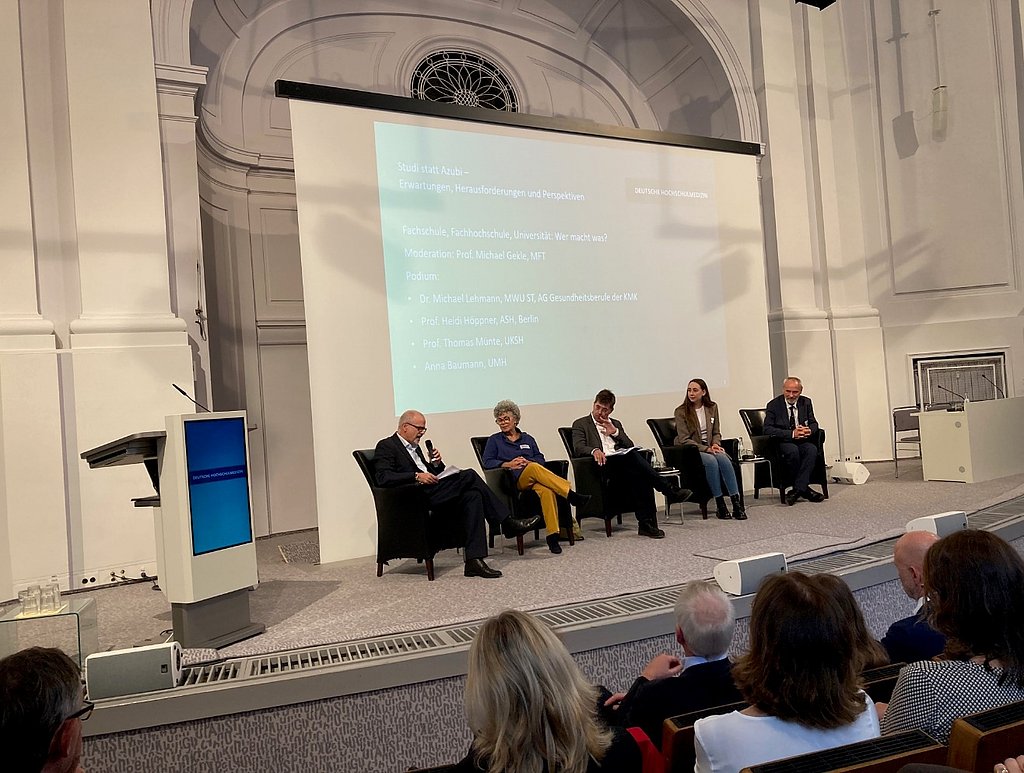German University Medicine (DHM), the joint umbrella organization of medical faculties and university hospitals, hosted a symposium for sustainable healthcare in Berlin on October 30, 2024. This only works on an interprofessional and cross-sectoral basis. The academization of healthcare professions is therefore essential in order to ensure the quality of patient care in all areas such as health promotion and prevention, curation and rehabilitation as well as nursing and palliative care and across all sector boundaries and thus make it fit for the future. "The complex requirements of modern medicine can only be met through sound training. Academized healthcare professions play a central role in patient care and are a key to sustainable and high-quality healthcare. Close integration between research, teaching and practice, as offered by university medicine, is essential," explained Prof. Dr. Matthias Frosch, President of the Association of Medical Faculties.
Prof. Dr. Elke Kraus from the Bachelor's degree course in Physiotherapy and Occupational Therapy, Prof. Dr. Heidi Höppner from the Interprofessional Healthcare - online course and Prof. Dr. Katja Boguth from the Bachelor's degree course in Nursing were on hand from the Alice Salomon University of Applied Sciences (ASH) Berlin to contribute the perspective of the universities of applied sciences (HAW).
After an overview of the previous and ongoing activities for the academization of healthcare professions by the Federal Ministry of Health (BMG) by Markus Algermissen, the expectations, challenges and perspectives of the various stakeholders in the federal states, universities of applied sciences and universities with regard to the higher education of these professions were discussed in several impulses and panel discussions. Prof. Heidi Höppner noted that the HAWs have played and continue to play a key role in the development of these professions. In view of the inviting parties (university medicine) and the participation of the Science Council and representatives of the federal states, she also missed representation from the Federal Ministry of Education and Research (BMBF). This is about setting the course for clinical research in nursing and therapeutic sciences and not just health services research. The BMBF is therefore an essential player in the academization of the health and nursing professions. The German Council of Science and Humanities has provided starting points for this in a position paper.
This was followed by a focus on the practical application possibilities of employees who have studied in the healthcare professions using the example of inpatient care in a university hospital. Finally, the development of the healthcare professions as a research-based scientific discipline was highlighted and discussed.
Conclusion: We owe where we are today to 25 years of development work on midwifery, nursing and therapy courses at universities of applied sciences.
Prof. Gabriele Meyer outlined precisely what is needed with regard to the imperative of scientific and disciplinary development. The Ministry of Research needs an explicit boost for research in these areas.
All in all, it was a successful start to good cooperation and a mandate for medical faculties to focus more on the academization of healthcare professions. (See Science Council recommendations 2012 and 2023). Ultimately, the goals must be quality assurance and improvement of care as well as the connectivity of education and research. Interprofessionalism and interdisciplinarity are key elements here in order to meet the requirements of a transformation of the healthcare and education system. There is still a lot to be done and the steps towards the academization of the therapy professions are small but steady. As the Tagesspiegel writes in its article "(Partial) academization with euphoria, but at a crawl" the following day: "German university medicine is campaigning for greater academization of the healthcare professions. The Federal Ministry of Health is dampening expectations that much will be implemented in this direction in this legislative period. The reform of the physiotherapy profession could be an exception, despite the long standstill."



